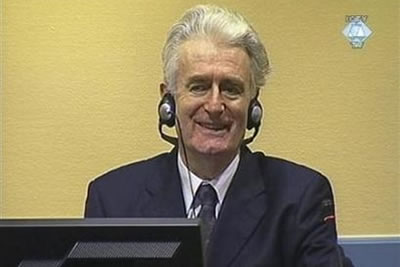Home
CALVARY IN ROGATICA
Protected witness KDZ 051 described at the trial of Radovan Karadzic the ordeal of a parent whose seven-and-a-half year old daughter and 13-year old son were raped by the Serb forces in Rogatica in 1992. The witness, himself a rape victim, said he was still haunted by the thought that the men he knew, his former friends and neighbors, committed the crimes
 Radovan Karadzic in the courtroom
Radovan Karadzic in the courtroom ‘They raped me too, but somehow I got through it. But when it came to my kids, it is difficult to come to terms with it’, protected witness KDZ 051 said at the trial of Radovan Karadzic. The prosecutor asked the witness about the consequences he and his family felt following their ordeal during the detention in Rogatica in 1992. ‘My seven-and-a-half-year old daughter was raped several times and my son, who was 13 at the time, was raped for months and that hurts the most,’ the witness responded. As the witness said, he is still haunted by the thought that those who committed the crime were the people he knew, his former friends and neighbors.
Speaking about his Calvary, the witness said that before the war Rogatica was a small town full of life, where people were on good terms. There were many mixed marriages. People celebrated Muslim, Catholic and Orthodox holidays. Life was good. This good life was ended in blood when the Serb army and Rajko Kusic’s Chetniks came. Rogatica was first brutally shelled for three months from the local hills. The Serb forces then entered the town and ‘cleansed’ it ruthlessly, not caring if their victims were children, invalids or the sick.
The witness and his family were detained for three and a half months in a local school building and about ten months at another location in Rogatica. Their ordeal left them deeply traumatized. ‘I got seriously ill. I have been in treatment for the past 16 years and I have tried to forget at least some of it, but I can’t. To this day I haven’t asked my wife if she was raped, too. I lack strength to do it’, the witness said and started crying. This marked the end of the examination-in chief and the judges ordered a break to allow the witness to compose himself and prepare for Radovan Karadzic’s cross-examination.
In his cross-examination Karadzic tried to prove that the forces under Kusic’s control didn’t shell Rogatica ‘for no reason’. According to Karadzic, they did it because Muslims from Rogatica ‘offered resistance’. Karadzic brought up Kusic’s combat reports stating that residents of the villages around Rogatica had come into town seeking shelter and were put up in the local high school building for their own safety. The witness said this was not true: this was not what he saw and experienced. The witness insisted that the civilians had not come in on their own: they were ‘arrested’ and taken to the school as prisoners.
When Karadzic put it to the witness that the OTP investigators wrote some paragraphs in his statement the witness called the claim ‘insulting’. He insisted no one ever told him what to say. The witness told Karadzic he didn’t hate him: the only reason why he came to The Hague was to recount his ordeal. Karadzic asked the witness if he had reported the crime against him and his family to the Serb authorities. The witness responded it was not necessary as everyone knew about it, including the police leadership and the commands of the Serb and Chetnik forces. Many of them took part in the crimes and sadly ruined their reputations, the witness said.
